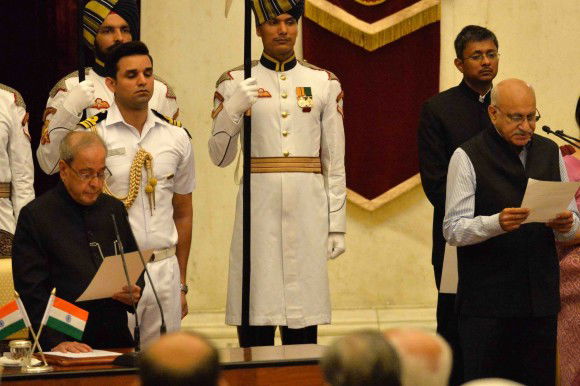Headlines
M.J. Akbar: A noted editor and ex-Congressman, now a BJP minister

New Delhi, July 5
Eminent journalist-turned-neta Mobasshar Javed "M.J." Akbar, once a Congress MP from Bihar's Kishanganj and a bitter critic of Narendra Modi post the 2002 riots in Gujarat, has been strong in his censure of the Congress party as a BJP spokesperson.
The inclusion of Akbar, who was a Congress spokesperson and known to be close to former Prime Ministers Rajiv Gandhi and Chandrashekhar, in Prime Minister Narendra Modi's council of ministers is no surprise.
His tilt towards the Bharatiya Janata Party (BJP), a party he had always opposed, and especially towards Narendra Modi in 2014 in the run-up to the general elections, had surprised many.
Akbar's brief stint as Rajya Sabha member from Jharkhand ended last month, but he was quickly brought in as a member of the Upper House from Madhya Pradesh.
Akbar announced his decision to join the saffron party ostensibly because he believed Modi was unjustifiably targeted since 2002 and since "none could prove" his involvement in the riots in the 12 long years.
A good orator and journalist who has to his credit the launch of two prestigious newspapers, The Telegraph and The Asian Age, Akbar, 65, is also author of a number of best seller non-fictions, including a biography of Jawaharlal Nehru titled "Nehru: The Making of India" and others like "Kashmir: Behind the Vale", "Riot After Riot" and "India: The Siege Within".
His book "Tinderbox: The Past and Future of Pakistan" published in 2012 that discusses the identity crisis and class struggles in Pakistan has been rated highly by the Sangh Parivar thinktanks and leaders, including Advani and Modi himself.
Akbar endeared himself to the party bosses when during the height of the intolerance debate in September 2015 he described Congress Vice President Rahul Gandhi as the "spoilt child of Indian democracy".
Team Modi considers Akbar an asset.
Earlier in his political career, Akbar won Lok Sabha election in 1989 by defeating Syed Shahbuddin, a strong proponent of Babri Masjid movement from Kishanganj. He, however, lost the seat later in 1991.
Akbar had backed then Prime Minister Rajiv Gandhi during the Bofors controversy and became the official spokesman of the Congress party.
He did not survive long in the Congress under P.V. Narasimha Rao.
By 1992-93 Akbar was back to journalism.
The inclusion of Akbar, who was a Congress spokesperson and known to be close to former Prime Ministers Rajiv Gandhi and Chandrashekhar, in Prime Minister Narendra Modi's council of ministers is no surprise.
His tilt towards the Bharatiya Janata Party (BJP), a party he had always opposed, and especially towards Narendra Modi in 2014 in the run-up to the general elections, had surprised many.
Akbar's brief stint as Rajya Sabha member from Jharkhand ended last month, but he was quickly brought in as a member of the Upper House from Madhya Pradesh.
Akbar announced his decision to join the saffron party ostensibly because he believed Modi was unjustifiably targeted since 2002 and since "none could prove" his involvement in the riots in the 12 long years.
A good orator and journalist who has to his credit the launch of two prestigious newspapers, The Telegraph and The Asian Age, Akbar, 65, is also author of a number of best seller non-fictions, including a biography of Jawaharlal Nehru titled "Nehru: The Making of India" and others like "Kashmir: Behind the Vale", "Riot After Riot" and "India: The Siege Within".
His book "Tinderbox: The Past and Future of Pakistan" published in 2012 that discusses the identity crisis and class struggles in Pakistan has been rated highly by the Sangh Parivar thinktanks and leaders, including Advani and Modi himself.
Akbar endeared himself to the party bosses when during the height of the intolerance debate in September 2015 he described Congress Vice President Rahul Gandhi as the "spoilt child of Indian democracy".
Team Modi considers Akbar an asset.
Earlier in his political career, Akbar won Lok Sabha election in 1989 by defeating Syed Shahbuddin, a strong proponent of Babri Masjid movement from Kishanganj. He, however, lost the seat later in 1991.
Akbar had backed then Prime Minister Rajiv Gandhi during the Bofors controversy and became the official spokesman of the Congress party.
He did not survive long in the Congress under P.V. Narasimha Rao.
By 1992-93 Akbar was back to journalism.

7 hours ago
Bihar Elections: India’s Drift Toward One-Party Hegemony (George Abraham)

8 hours ago
Former US Treasury Secretary, Harvard head hit by disclosures in Epstein files

10 hours ago
Manushi Chhillar celebrates 8 Years of her Miss World win

10 hours ago
India-US partnership strong, expanding across strategic and economic sectors: Piyush Goyal

10 hours ago
Cloudflare outage hits X and several digital platforms globally, including India

13 hours ago
After row over childlike sex dolls at Shein, now Hindus upset at Shein for Lord Ganesh blanket

15 hours ago
Kangana Ranaut left speechless by the beauty, culture & authenticity of Gujarat

15 hours ago
Shakti Mohan pens heartfelt b’day note for sister Neeti: You are my life’s biggest blessing

15 hours ago
Arjun Rampal, Akshaye Khanna spell terror in supercharged ‘Dhurandhar’ trailer

15 hours ago
Sonali Bendre recalls the backstage chaos on the set of 'Pati Patni Aur Panga'

15 hours ago
Shraddha Kapoor has a pertinent question for photo editors

15 hours ago
Huma Qureshi on her bond with success, failure: I'm able to enjoy my work

15 hours ago
Akshay Kumar & Tiger Shroff flaunt picture perfect abs during their Juhu Beach edition of 'Ocean’s 9'






















